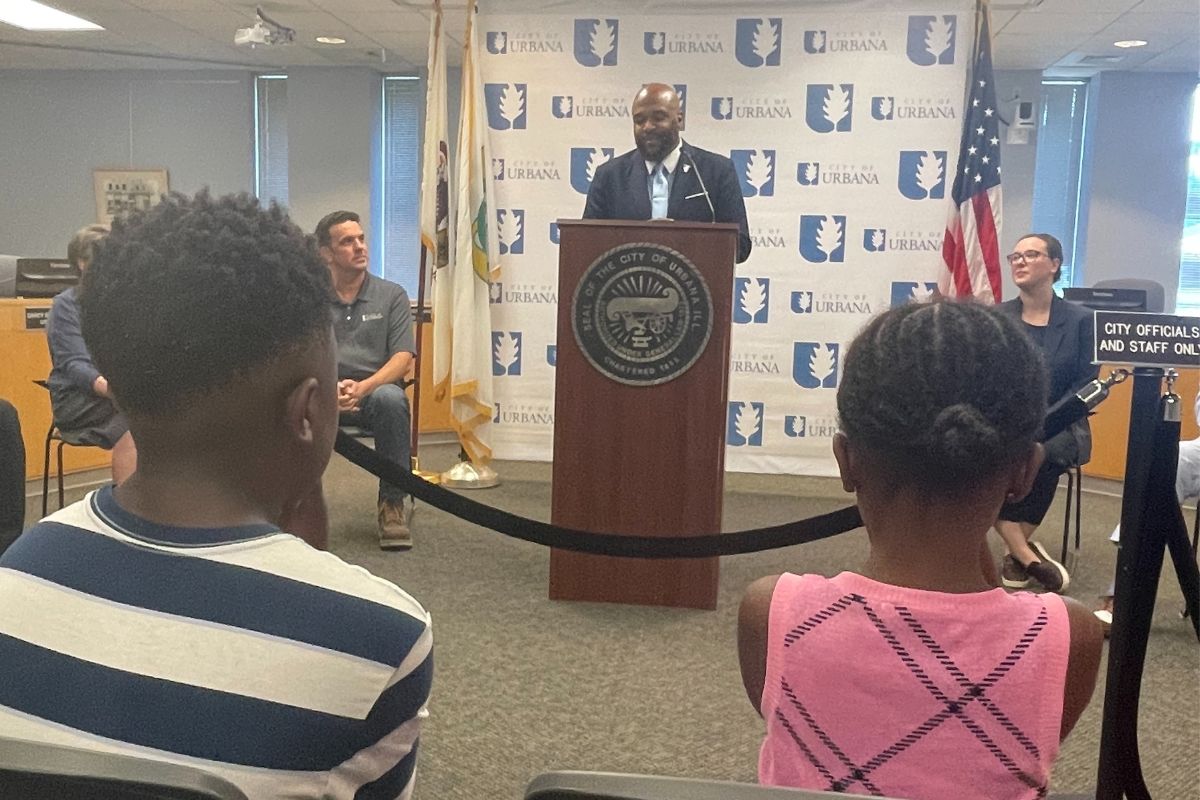URBANA, IL (Chambana Today) — In a public address on Wednesday, Mayor Deshawn Williams marked his first 100 days in office by outlining key accomplishments, introducing new community-focused initiatives, and committing to a long-term vision rooted in equity, trust, and resident engagement.
“These first early days have been about listening, learning, building relationships, and laying a strong foundation for the work ahead,” Williams told a crowd of city officials, staff, and community members. “We’ve hit the ground running—and I’m proud to say we’re already making meaningful progress by prioritizing the voices, values, and visions of the people who call Urbana home.”
Since taking office, Williams said his administration has been guided by a clear goal: aligning city government with the community’s shared priorities. He pointed to the recent passage of a balanced city budget that funds core services while advancing broader goals like public safety reform, housing stability, and infrastructure renewal. “Our budget does more than fund services—it reflects our shared priorities,” Williams said. “It’s built for resilience—designed to help Urbana not just withstand future challenges but rise to meet them.”
Williams also highlighted a $25,000 city investment to help form an intergovernmental commission supporting a Reparations Study. “We’re the first local government to take the lead on this,” he said. “It’s a crucial step toward addressing historical inequities and advancing restorative justice for Black residents of Urbana.”
Public safety was another major focus of the mayor’s first 100 days. The city has maintained core police staffing levels while expanding its Community Engagement Team and finalizing the implementation of an Alternative Response Task Force. Williams said. “We’re responding to behavioral health crises with professionals trained in de-escalation and support, not just enforcement. It’s a model built around dignity, safety, and healing.”
Williams emphasized strategic investments in vulnerable communities, noting over $4.5 million secured to support families, seniors, and unhoused residents. The city also committed $100,000 to expand immigrant services and $200,000 to assist victims of domestic violence. “Every person deserves a place where they feel safe, supported, and seen,” he said. Infrastructure, too, is seeing record investment, with more than $30 million allocated this year for street and sidewalk repairs and public space enhancements. “These aren’t just construction projects—they’re investments in mobility and accessibility,” said Williams.
As the state eliminates the grocery tax, Urbana will retain its local 1% grocery tax, a decision Williams framed as a responsible way to protect city services. He also shared news of a long-awaited development on the city’s north side: “We are finalizing an agreement for the development of the Heart Strong Grocery store,” he announced. “It’s a meaningful investment in health, access, and equity for this historic neighborhood.”
Williams also praised city staff and Council members for their role in a smooth leadership transition, and he formally introduced two new appointments: Darius White as City Administrator and Olivia Jovine as Community Development Services Director. “We’ve strengthened our leadership team,” he said. “And I want to acknowledge our dedicated City staff—public servants who bring knowledge, care, and consistency to Urbana every day.”
A major milestone of the new administration has been the finalization of Imagine Urbana, a comprehensive citywide plan shaped by input from hundreds of residents. “It’s more than a blueprint for our future—it’s a commitment,” Williams said.” The mayor summarized the community’s top priorities, including connected and welcoming neighborhoods, affordable housing, safer streets for all modes of travel, inclusive public spaces, and an economy that creates opportunity for every resident.
Youth engagement and workforce development have also emerged as early cornerstones of the Williams administration. He touted the launch of the KidzBiz Youth Entrepreneur Pop-Up Shop and the creation of a pre-apprenticeship program in partnership with local unions and trades. “This is workforce development with purpose—building futures, right here at home,” Williams said.
Looking ahead, Williams announced a new initiative: the revitalization of Philo Road, a critical corridor on the southeast side of the city. “Philo Road is more than just a street—it’s a lifeline,” he said. “For too long, it’s been underfunded, underserved, and overlooked. But that ends now.” The project, called The Philo Road Ahead, will include community input sessions and stakeholder engagement beginning this year. “It’s about making sure that Philo Road serves everyone who depends on it—whether it’s for getting to work, accessing essential services, or building stronger community ties.”
As he wrapped up his remarks, Williams struck a hopeful and determined tone. “Urbana’s next chapter will be shaped by every one of us—by the choices we make, the relationships we build, and the vision we share,” he said. “These first 100 days were just the beginning—our first chapter in a much larger story. Let’s keep going. Let’s keep building.”




